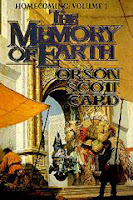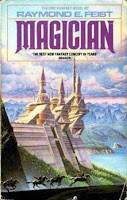Fictional Example: Mad Max 2 (George Miller) - 1982 saw the return of Max Rockatansky and in the intervening years what was left of civilation has fully descended into anarchy. What passes for government is either the gang rules of the Lord Humungus' Marauders or the commune style democracy led by Pappagallo.
Max doesn't fit neatly into either of these camps and only agrees to fight alongside the travellers because his car is held hostage. In the original script Pappagallo was the CEO of 7 Sisters Petroleum and interestingly some of the marauders appear to be ex cops, although it is not explicitely referenced.
Fictional Example: Ankhmorpork Discworld (Terry Pratchett). Despite the "sharing" of power with the Guilds, the city is governed through a system of one man, one vote - the Patrician being the "one man" in question. The best portrayal of Lord Vetinari can be found in the Sky mini series "Going Postal". Charles Dance's performance is a masterclass in veiled menace and manipulation of Machiavellian proportions.Matriarchy - Not so much a form of Government but a is a social system in which women hold the primary power positions in roles of political leadership, moral authority, social privilege and control of property.
Fictional Example: Memory of Earth (Orson Scott Card) In the first book of the Homecoming Harmony series we are introduced to the matriarchal society of Basilica. All property is owned by the women and many of them hold high ranking positions within the government and academia. Despite this being OSC's "Book of Mormon" I am quite fond of the concept of the oversoul and how it controls what technology is allowed to be invented to essentially prevent the warlike tendencies of humanity.
Plutocracy - Rule by the wealthy; a system wherein governance is indebted to, dependent upon or heavily influenced by the desires of the rich. Arguably every government is financed by plutocrats, as the saying goes "He who has the money makes the rules". When the rules are made by the rich, who do you think reaps the greatest benefit? Oh it's the rich, funny that...
Fictional Example: Game of Thrones (George R R Martin) Technically this is a feudal monarchy with the various lords of the Seven Kingdoms being appointed by ruling King. The position of the King is largely decided by the person with the biggest standing army or banners pledged to their house. Financing this support comes from key houses such as the Lannisters and the Tyrells in exchange for grace and favour.
Unfortunately the War of the Five Kings leads to Tyrwin Lannister becoming massively indebted to the Iron Bank of Braavos and when that line of credit dries up Cersei must turn to Euron Greyjoy to help her in the final battle for the Iron Throne. Once again the stand out performances always come from Charles Dance as he pulls the strings, until he gets ignominiously shot by his son Tyrion whilst on the toilet.
Stratocracy - Rule by military service; a system of governance composed of military government in which the state and the military are traditionally or constitutionally the same entity. Citizens with mandatory or voluntary active military service or who have been honorably discharged have the right to govern.
Fictional Example: Starship Troopers (Robert Heinlein). "Service guarantees Citizenship" was the oft quoted line in the Mobile Infantry recruitment ads. Johnny Rico's rich parents both want him to go to Harvard. When they are both killed in the Buenos Aires meteor bombardment it only fuels Johnny's desire to do his bit for the war effort.
Technocracy - Rule by the educated or technical experts; a system of governance where people who are skilled or proficient govern in their respective areas of expertise in technology would be in control of all decision making. In fantasy fiction Technology would of course be replaced by Magic.
Fictional Example: The Rift War Saga (Raymond E Feist). Whilst all Tsurani are governed by the Emperor along the lines of a Feudal system, the Assembly of Magicians stands apart from the law and no magician can be compelled by any non magician.Which just leaves...
Idiocracy - When a US Army cryogenics experiment goes wrong Private Joe Bauers (Luke Wilson) and Rita (Maya Rudolph) awake in a nightmare future. Americans have devolved into idiots ruled by an ex Wrestler President Camacho (Terry Crews) and they are the most intelligent people in society by default. I just love the craziness of this movie.








No comments:
Post a Comment